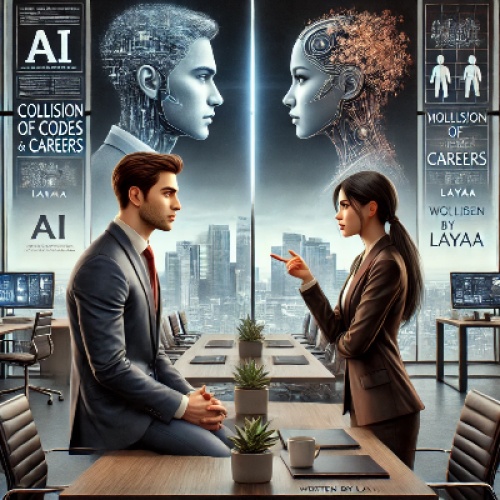In the heart of Bangalore's bustling tech district, two companies stood as opposites, their towering buildings facing each other like sworn rivals. EvoAI Solutions, founded by Aarav Mehta, was a beacon of technological revolution, automating processes and replacing human jobs with artificial intelligence. SkillCrafters, led by Ishita Rao, was its counterforce, dedicated to upskilling human workers to retain their positions in a world increasingly dominated by AI. Their ideologies clashed so intensely that their employees refused to even acknowledge one another when they crossed paths at local caf?s or business expos. The city's business community and media fed on their rivalry, branding it the war of "Tech vs. Talent."
Tensions reached a boiling point when EvoAI secured a contract with a multinational corporation that had previously been SkillCrafters' client. The contract involved implementing AI-driven hiring systems, reducing the need for human recruiters - a direct hit to Ishita's business. Enraged, she stormed into Aarav's office, bypassing his confused receptionist. When she entered, she found him calmly typing on his sleek, AI-enhanced workstation, his posture exuding an air of detached confidence.
"You've crossed the line, Aarav," she said, voice firm. "You're not just replacing mundane jobs anymore. You're replacing careers. People have mortgages, families, responsibilities. And you - " she gestured around his cold, ultra-modern office, " - think a machine can replace everything?"
Aarav leaned back, unfazed. "It's not about replacing people. It's about progress. Efficiency. If a machine can do a job faster and with fewer errors, businesses will choose that over humans. It's inevitable, Ishita. I just happen to be ahead of the curve."
She scoffed. "And what about humanity? Where does your 'progress' leave them?"
"Adapting," he said simply. "If they don't, they become obsolete."
Their argument ended in a stalemate, neither willing to concede an inch. Over the next few months, the battle between EvoAI and SkillCrafters became even more aggressive. Ishita took on more clients, running seminars on AI-proof careers, while Aarav rolled out new AI models that could automate entire departments. Their rivalry became a spectacle, with industry leaders watching closely, waiting to see who would emerge victorious.
Then came the crisis that neither of them expected. A major scandal broke out in the AI industry - one of EvoAI's competitor firms had been caught using biased AI hiring systems that discriminated based on gender and ethnicity. The government launched an inquiry into AI-driven recruitment, halting many contracts, including the one Aarav had taken from Ishita's client. Suddenly, businesses hesitated to adopt AI solutions, and job seekers were wary of fully automated hiring processes. The tide was shifting, and both companies were affected.
Ishita saw this as an opportunity to prove that AI should be used as a tool to enhance, not replace, human workers. Aarav, on the other hand, knew this was a setback that could slow down AI adoption for years. Frustrated but pragmatic, he analyzed the situation and realized he needed an expert on human workforce development. Ironically, the best person for the job was his greatest rival.
Reluctantly, Aarav reached out to Ishita with a proposal: a partnership. Instead of fully automating hiring processes, they could develop a hybrid model where AI assisted but did not replace human decision-making. At first, Ishita was suspicious. She assumed he was just looking for a way to salvage his business, but as they worked through the details, she saw potential in his plan. Together, they could create an ecosystem where AI and human intelligence coexisted.
Working side by side was far from easy. Aarav was methodical, logical to the point of being ruthless. Ishita was empathetic, always considering the human impact of their solutions. Their debates were as intense as their rivalry had been, but for the first time, they were fighting for the same goal. Late nights turned into long discussions, their professional clashes shifting into something deeper - an understanding, a mutual respect.
One evening, after hours of working on their joint presentation for an upcoming industry summit, they found themselves alone in Ishita's office. She stretched, exhausted, and laughed. "Who would've thought we'd end up here?"
Aarav smirked. "Certainly not the media. They probably expect us to sabotage each other mid-presentation."
She looked at him thoughtfully. "But we make a good team, don't we?"
Something unspoken passed between them. The rivalry that had defined them for years had evolved into something else entirely. Not just business partners, but something more.
The industry summit was a turning point. Their presentation on the future of AI-human collaboration was met with overwhelming support. Investors lined up, and companies that had previously been skeptical about AI now saw a balanced approach as the future. EvoAI and SkillCrafters merged into EvoCraft, a company that combined AI efficiency with human expertise, revolutionizing the hiring landscape.
Their professional partnership seamlessly transitioned into something personal. The fire that had once fueled their rivalry now fueled their relationship. Their differences, which had once been a source of conflict, became their greatest strength. Together, they proved that technology and humanity weren't opposing forces - they were two sides of the same coin.
Their love story was not one of fairy tales but of fierce debates, reluctant compromises, and mutual growth. But in the end, it was undeniable: they were better together, both in business and in life.
Tensions reached a boiling point when EvoAI secured a contract with a multinational corporation that had previously been SkillCrafters' client. The contract involved implementing AI-driven hiring systems, reducing the need for human recruiters - a direct hit to Ishita's business. Enraged, she stormed into Aarav's office, bypassing his confused receptionist. When she entered, she found him calmly typing on his sleek, AI-enhanced workstation, his posture exuding an air of detached confidence.
"You've crossed the line, Aarav," she said, voice firm. "You're not just replacing mundane jobs anymore. You're replacing careers. People have mortgages, families, responsibilities. And you - " she gestured around his cold, ultra-modern office, " - think a machine can replace everything?"
Aarav leaned back, unfazed. "It's not about replacing people. It's about progress. Efficiency. If a machine can do a job faster and with fewer errors, businesses will choose that over humans. It's inevitable, Ishita. I just happen to be ahead of the curve."
She scoffed. "And what about humanity? Where does your 'progress' leave them?"
"Adapting," he said simply. "If they don't, they become obsolete."
Their argument ended in a stalemate, neither willing to concede an inch. Over the next few months, the battle between EvoAI and SkillCrafters became even more aggressive. Ishita took on more clients, running seminars on AI-proof careers, while Aarav rolled out new AI models that could automate entire departments. Their rivalry became a spectacle, with industry leaders watching closely, waiting to see who would emerge victorious.
Then came the crisis that neither of them expected. A major scandal broke out in the AI industry - one of EvoAI's competitor firms had been caught using biased AI hiring systems that discriminated based on gender and ethnicity. The government launched an inquiry into AI-driven recruitment, halting many contracts, including the one Aarav had taken from Ishita's client. Suddenly, businesses hesitated to adopt AI solutions, and job seekers were wary of fully automated hiring processes. The tide was shifting, and both companies were affected.
Ishita saw this as an opportunity to prove that AI should be used as a tool to enhance, not replace, human workers. Aarav, on the other hand, knew this was a setback that could slow down AI adoption for years. Frustrated but pragmatic, he analyzed the situation and realized he needed an expert on human workforce development. Ironically, the best person for the job was his greatest rival.
Reluctantly, Aarav reached out to Ishita with a proposal: a partnership. Instead of fully automating hiring processes, they could develop a hybrid model where AI assisted but did not replace human decision-making. At first, Ishita was suspicious. She assumed he was just looking for a way to salvage his business, but as they worked through the details, she saw potential in his plan. Together, they could create an ecosystem where AI and human intelligence coexisted.
Working side by side was far from easy. Aarav was methodical, logical to the point of being ruthless. Ishita was empathetic, always considering the human impact of their solutions. Their debates were as intense as their rivalry had been, but for the first time, they were fighting for the same goal. Late nights turned into long discussions, their professional clashes shifting into something deeper - an understanding, a mutual respect.
One evening, after hours of working on their joint presentation for an upcoming industry summit, they found themselves alone in Ishita's office. She stretched, exhausted, and laughed. "Who would've thought we'd end up here?"
Aarav smirked. "Certainly not the media. They probably expect us to sabotage each other mid-presentation."
She looked at him thoughtfully. "But we make a good team, don't we?"
Something unspoken passed between them. The rivalry that had defined them for years had evolved into something else entirely. Not just business partners, but something more.
The industry summit was a turning point. Their presentation on the future of AI-human collaboration was met with overwhelming support. Investors lined up, and companies that had previously been skeptical about AI now saw a balanced approach as the future. EvoAI and SkillCrafters merged into EvoCraft, a company that combined AI efficiency with human expertise, revolutionizing the hiring landscape.
Their professional partnership seamlessly transitioned into something personal. The fire that had once fueled their rivalry now fueled their relationship. Their differences, which had once been a source of conflict, became their greatest strength. Together, they proved that technology and humanity weren't opposing forces - they were two sides of the same coin.
Their love story was not one of fairy tales but of fierce debates, reluctant compromises, and mutual growth. But in the end, it was undeniable: they were better together, both in business and in life.





